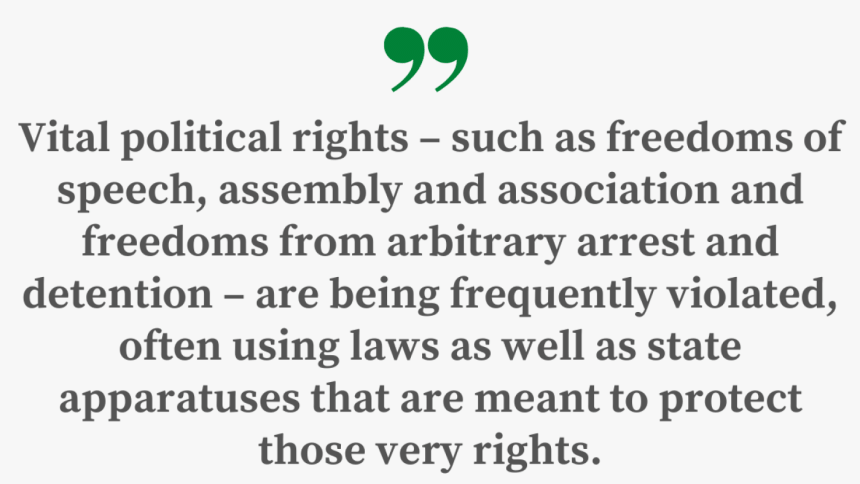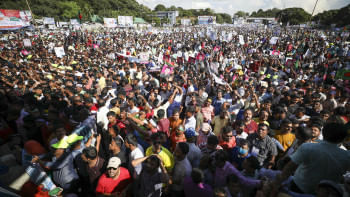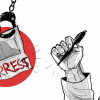Why politicians should study human rights

For human rights advocates, 2022 has been a catastrophic year. Just pick a random day from the calendar and scroll through the archive of that day's newspaper, any newspaper. Inevitably, you will come across some egregious abuses of human rights. And just as inevitably, you will have some politician or wannabe politician or public servant doing what they should have known better than to do: allowing those abuses or, worse still, engaging in them.
Public representatives and servants are not immune to the faults and follies of the wider society. Nor are they the only ones to violate human rights. But the way they position themselves – as guardians of public interests – and the power they exercise in that capacity make them the central focus of any discussion on rights issues. Right now, that focus is firmly, and justifiably, on people's right to freedom of assembly, thanks to the increasing hostilities faced by the supporters of a resurgent BNP. As I write this, news has emerged that a couple of top BNP leaders were jailed before being picked up by police. Over the past three days, BNP saw its activists killed, injured, detained and sued, its central office raided, and its supporters harassed in various other ways, all because of its planned rally today, with the permission for its choice of venue eluding it even at the last minute.
This, incidentally, marks a dramatic build-up not only to the rally but also to the Human Rights Day, which falls on December 10.
Despite claims to the contrary, all this drama had less to do with law and order than with political considerations. You could say this is politics 101 in Bangladesh. But it is also human rights abuse 101. And it is just one case among many. By the year's end, we will probably have a rundown on such abuses of rights and crimes in different sectors – the annual list of "objectionables," as I call them – courtesy of NGOs. What those will most certainly show is how human rights are being violated on the flimsiest of pretexts with no accountability for the accused perpetrators, often at the behest of those who should have known better.

Why do I stress on having knowledge of human rights? Can an awareness of what constitutes human rights make them less likely to be violated? For politicians, one would hope, it might. It might make them more cautious, help them understand the full context of the lives of people they swore to serve, and sensitise them to the pain and suffering caused when a right is violated. At the minimum, it will make them recognise those rights. It's not enough to just know about human rights, however. Politicians need to see them in the wider context of their political, civic, economic and cultural dynamics, and strive to become activists for the sake of the people.
One way this can happen is by making it compulsory for all aspirants and occupants of public office to read – and discuss among peers – the Universal Declaration of Human Rights, adopted on this day in 1948. It's ironic how few people actually read the document, despite it being short and translated in over 500 languages and dialects. The declaration lists 30 fundamental rights to which everyone is entitled. They range from the sublime to the mundane, some less obvious than others, but each equally enforceable. Among them are the right to life and liberty, right to freedom of thought, conscience and religion, right to freedom of opinion, right to freedom of movement, peaceful assembly and association, right of equal access to public service, right to equal pay, right to education, etc.
Our constitution as well as major human rights treaties, all inspired by the UN declaration, should also be studied.
The importance of this exercise is undeniable. For example, if you ask a doctor or lawyer to identify which of the 30 articles of the Universal Declaration they can most relate to, they will probably prefer one to another. But all are equally important for politicians, who represent people of all professions, vocations and classes. Imagine what a politician imbued with a firm sense of rights and duties can do. Imagine what citizens, aware of their rights and inherent dignity, can do to hold their representatives accountable. It's wishful thinking that awareness alone can lead to change. But no change can come without an awareness first.
This exercise is all the more important at a time when Bangladesh's ruling class, and overtly politicised public institutions, are failing to prevent widespread abuse of rights or their selective implementation. Vital political rights – such as freedoms of speech, assembly and association and freedoms from arbitrary arrest and detention – are being violated with reckless abandon, using laws as well as state apparatuses that are meant to protect those very rights. The rates of convictions in all sorts of criminal offices remain very low. People are being deprived of vital services. They are afraid to protest, as threats and intimidations overflow every time they try to.
Clearly, there is a huge gulf between official policy and practice, indicating a questionable human rights agenda that goes into overdrive when it comes to scoring propaganda victories but goes limp when it comes to protecting the rights of critics and rivals. We must set our human rights agenda right. Politicians – on both sides of the aisle – must lead the path, and they can do so with a much-needed lesson in human rights.
Badiuzzaman Bay is an assistant editor at The Daily Star.

 For all latest news, follow The Daily Star's Google News channel.
For all latest news, follow The Daily Star's Google News channel. 










Comments